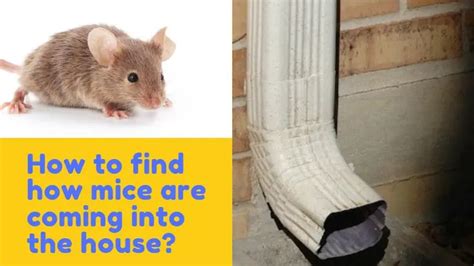can mice squeeze behind electric boxes Clean behind and under big appliances and furniture: Mice will hide underneath or behind your refrigerator, washer, dryer, chest freezer, bed, wardrobe, chest of drawers, etc. By regularly moving these, you can eliminate . A junction box is an electrical enclosure that houses one or more wiring connections. The box protects the connections, which usually contain vulnerable points such as wire splices, from environmental conditions and .
0 · why do mice get into house
1 · mice enter your house
2 · mice creeping into house
3 · how to get mice into your house
4 · how do mice get inside your house
5 · do mice sneak into house
6 · do mice chew through screens
7 · can mice get into your house
A 3-axis machine is a CNC machine that can mill on 3 different paths: vertically, horizontally, and diagonally. Having 3 axes allows it to mill 3-dimensional objects with relative ease. What Are the 3 Axes on a Milling Machine?
why do mice get into house
Forget silicone unless it's the bitter flavored one, but this is only a temp solution. All of those wires need to be rerouted into a single conduit that goes into your house. Each end needs metal caps that fits the wire sizes and . In my 1st place mice chewed through the low voltage wire and we found a complete skeleton of a previous mouse that had nested in the box. Another time one got into .
mice enter your house
Exterminator found mouse poo near the electrical panel and found that they are getting in the house via a large gap around the conduit going to the electrical panel: http://imgur.com/wtt1JGk. He suggested to stuff the gap with steel wool .
Clean behind and under big appliances and furniture: Mice will hide underneath or behind your refrigerator, washer, dryer, chest freezer, bed, wardrobe, chest of drawers, etc. By regularly moving these, you can eliminate .
Unfortunately, rodents can be persistent, finding tiny cracks to squeeze through and even chewing their own way in. Don't Neglect to Repair the Damage. If you suspect rodents have been .
Preventing mice from chewing wires involves limiting the rodents' access to them in the first place. You can cover wires with a specially formulated antirodent electrical tape that is capsaicin infused and repels mice with its .
I have found a hole about 2 inches in diameter in my electricity meter box where a thick electrical cable enters the house, which I think might be where the mice are getting into the walls. What can I use to block the hole that . Unfortunately, the risk of an electrical fire increases when rodents come into contact with loose wiring, electrical panels, and more. That’s why it’s important to prevent rodents from entering the home as much as possible, and .
Forget silicone unless it's the bitter flavored one, but this is only a temp solution. All of those wires need to be rerouted into a single conduit that goes into your house. Each end needs metal caps that fits the wire sizes and no more. Mice can easily squeeze thru a dime size hole, so no hole can be bigger than a pencil.
mice creeping into house
Mice Can Squeeze Through Electric Line Openings. Just like the vents and plumbing in our home, we can easily overlook wiring holes as a potential mouse entry point. Any area where cable wires run from outside to inside is a potential entry point. The space around the wiring may look small, but mice can fit through the smallest of spaces – ¼ . Understand that mice can fit into spaces only 1/4-inch wide and tall, while rats can squeeze into 1/2-inch-diameter openings. Your open dryer vent, window-frame cracks, and attic-vent openings are easy pathways for rodents. In my 1st place mice chewed through the low voltage wire and we found a complete skeleton of a previous mouse that had nested in the box. Another time one got into the electrical box and was moving around and caused the a/c to trip the circuit breaker randomly. Exterminator found mouse poo near the electrical panel and found that they are getting in the house via a large gap around the conduit going to the electrical panel: http://imgur.com/wtt1JGk. He suggested to stuff the gap with steel wool to keep them out; is this safe? Should I be using some kind of putty and/or foam insulation to seal this up?

Clean behind and under big appliances and furniture: Mice will hide underneath or behind your refrigerator, washer, dryer, chest freezer, bed, wardrobe, chest of drawers, etc. By regularly moving these, you can eliminate many desirable hiding spots for mice.Unfortunately, rodents can be persistent, finding tiny cracks to squeeze through and even chewing their own way in. Don't Neglect to Repair the Damage. If you suspect rodents have been chewing on your electrical work, get in touch with an expert electrician immediately to assess the damage and perform any necessary repairs. Preventing mice from chewing wires involves limiting the rodents' access to them in the first place. You can cover wires with a specially formulated antirodent electrical tape that is capsaicin infused and repels mice with its spicy taste.
I have found a hole about 2 inches in diameter in my electricity meter box where a thick electrical cable enters the house, which I think might be where the mice are getting into the walls. What can I use to block the hole that the mice won't be able to move or chew through?
Unfortunately, the risk of an electrical fire increases when rodents come into contact with loose wiring, electrical panels, and more. That’s why it’s important to prevent rodents from entering the home as much as possible, and to recognize the .
Forget silicone unless it's the bitter flavored one, but this is only a temp solution. All of those wires need to be rerouted into a single conduit that goes into your house. Each end needs metal caps that fits the wire sizes and no more. Mice can easily squeeze thru a dime size hole, so no hole can be bigger than a pencil. Mice Can Squeeze Through Electric Line Openings. Just like the vents and plumbing in our home, we can easily overlook wiring holes as a potential mouse entry point. Any area where cable wires run from outside to inside is a potential entry point. The space around the wiring may look small, but mice can fit through the smallest of spaces – ¼ . Understand that mice can fit into spaces only 1/4-inch wide and tall, while rats can squeeze into 1/2-inch-diameter openings. Your open dryer vent, window-frame cracks, and attic-vent openings are easy pathways for rodents. In my 1st place mice chewed through the low voltage wire and we found a complete skeleton of a previous mouse that had nested in the box. Another time one got into the electrical box and was moving around and caused the a/c to trip the circuit breaker randomly.
Exterminator found mouse poo near the electrical panel and found that they are getting in the house via a large gap around the conduit going to the electrical panel: http://imgur.com/wtt1JGk. He suggested to stuff the gap with steel wool to keep them out; is this safe? Should I be using some kind of putty and/or foam insulation to seal this up? Clean behind and under big appliances and furniture: Mice will hide underneath or behind your refrigerator, washer, dryer, chest freezer, bed, wardrobe, chest of drawers, etc. By regularly moving these, you can eliminate many desirable hiding spots for mice.
Unfortunately, rodents can be persistent, finding tiny cracks to squeeze through and even chewing their own way in. Don't Neglect to Repair the Damage. If you suspect rodents have been chewing on your electrical work, get in touch with an expert electrician immediately to assess the damage and perform any necessary repairs. Preventing mice from chewing wires involves limiting the rodents' access to them in the first place. You can cover wires with a specially formulated antirodent electrical tape that is capsaicin infused and repels mice with its spicy taste. I have found a hole about 2 inches in diameter in my electricity meter box where a thick electrical cable enters the house, which I think might be where the mice are getting into the walls. What can I use to block the hole that the mice won't be able to move or chew through?
empeco metal bread box

how to get mice into your house
how do mice get inside your house
do mice sneak into house
Bell boxes, also known as junction boxes, are designed to house and protect electrical connections and wiring. These boxes are particularly engineered to be weatherproof, making them ideal for use in environments exposed to moisture, dust, or extreme temperatures.
can mice squeeze behind electric boxes|why do mice get into house